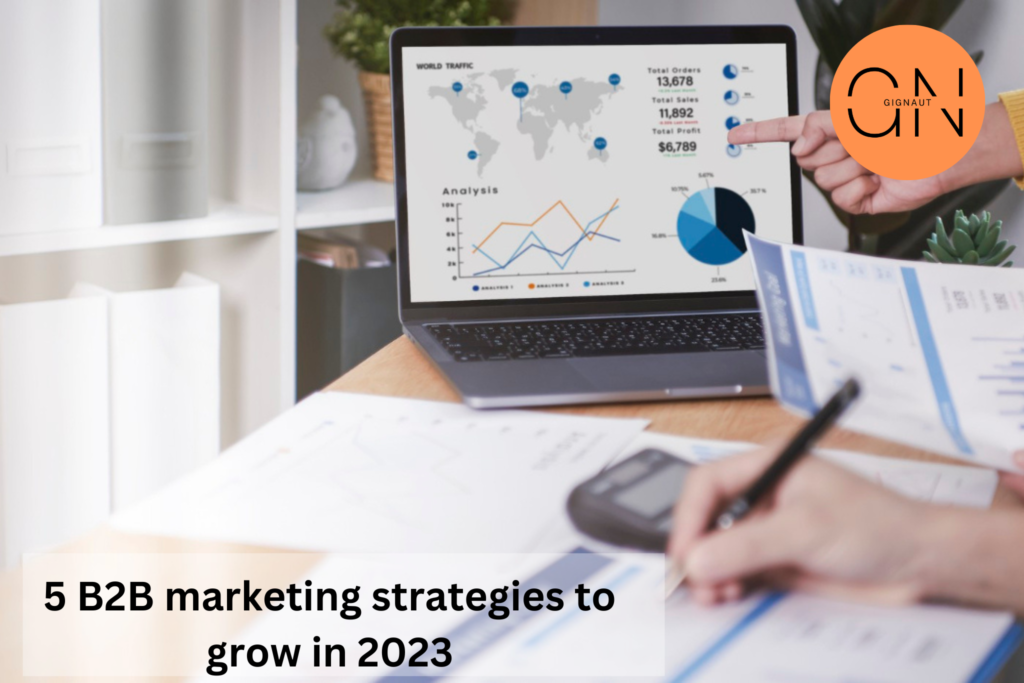Social media has become an integral part of many businesses’ marketing strategies, and it can be an effective channel for B2B marketing as well. According to a survey by the Content Marketing Institute, 94% of B2B marketers use social media to distribute content, and 81% of those surveyed said that social media is an important part of their overall B2B social media marketing strategy.
In today’s digital age, social media has become a powerful tool for businesses to connect with their audience and drive growth. For B2B companies, social media offers an opportunity to reach a targeted audience and establish a strong online presence.
However, many B2B companies struggle to effectively leverage social media to achieve their marketing goals. This is where a well-thought-out social media strategy comes into play. By taking a systematic approach and considering factors such as target audience, content, engagement, paid advertising, and measurement, B2B companies can effectively use social media to reach their marketing objectives.
In this article, we will explore the key elements of a successful social media strategy for B2B companies and provide tips and best practices to help you make the most of your social media presence. So, whether you’re just getting started with social media or looking to refine your existing strategy, read on to learn how to use social media for B2B marketing.
The Benefits of Social Media for B2B Marketing
One of the main benefits of using social media for B2B marketing is the ability to reach a large and targeted audience. With over 4.2 billion active users on social media worldwide, there is a good chance that your target audience is using at least one social media platform. By creating a presence on the platforms where your audience is most active, you can effectively reach and engage with them.
In addition to reaching a wide audience, social media also offers opportunities for lead generation. By sharing valuable content and offering promotions or discounts, you can attract potential customers and encourage them to learn more about your products or services.
Social media is also a powerful tool for building brand awareness. By consistently posting engaging content and interacting with your followers, you can establish your B2B brand as a thought leader in your industry and establish trust with your audience.
Here are some tips for using B2B social media to reach and engage with potential business customers:
Identify your target audience
When it comes to creating an effective b2b social media marketing strategy, it is crucial to have a clear understanding of your target audience. Knowing who you are trying to reach will help you make informed decisions about which social media platforms to use and how to approach your campaigns.
There are several key factors to consider when defining your target audience, such as their age, location, and job titles. These factors can play a significant role in determining which social media platforms are most effective for your marketing efforts. For example, LinkedIn is widely considered to be the go-to platform for B2B marketing due to its large professional user base and focus on business-related content. However, other platforms like Twitter, Facebook, and Instagram can also be effective, depending on the specifics of your target audience and industry.
For example, if your target audience is primarily young professionals, you may find that Instagram and Twitter are more effective platforms for reaching them. On the other hand, if your audience is primarily older executives, you may have more success with LinkedIn or Facebook. It is important to keep in mind that your audience may be active on multiple social media platforms, so it is wise to consider a multi-platform approach to reach them effectively.
Additionally, it is important to understand the unique features and benefits of each social media platform. For example, Instagram is known for its visually-appealing content, while LinkedIn is known for its professional networking capabilities. By utilizing the strengths of each platform, you can create targeted and effective marketing campaigns that resonate with your audience.
Create a content calendar
Creating a consistent and regular presence on social media is key to a successful b2b social media strategy. To achieve this, it is important to plan out your social content in advance and have a clear idea of what you want to share with your followers. This will not only help you maintain a consistent presence but also ensure that you are using your social media platforms effectively and efficiently.
When planning your content, consider including a mix of promotional content, industry news and updates, and engaging content such as polls or quizzes. Promotional content can help you drive sales and promote your products or services, while industry news and updates will keep your followers informed and engaged. Engaging content, such as polls and quizzes, can help you build relationships with your followers and increase engagement on your social media platforms.
Having a content calendar can also be a valuable tool for managing your social media presence. With a content calendar, you can schedule your posts in advance, vary the types of content you post, and keep things fresh for your followers. This can also help you ensure that you are not overloading your followers with too much promotional content and that you are balancing it out with other types of content.
Use targeted hashtags
Hashtags can help increase the visibility of your content and make it easier for potential customers to find you. Use relevant, industry-specific hashtags to reach a targeted audience. Research popular hashtags in your industry and consider creating your own branded hashtag to use in your social media campaigns.
Using targeted hashtags in your social media marketing campaigns can be a powerful tool for reaching a specific audience and increasing the visibility of your content. Hashtags allow your posts to be easily discoverable by users who are searching for content related to your industry or specific keywords. By using relevant and industry-specific hashtags, you can ensure that your content is being seen by users who are more likely to be interested in your products or services.
One important aspect of using hashtags effectively is researching popular hashtags in your industry. By identifying which hashtags are currently trending or being widely used by other businesses in your field, you can ensure that your content is being seen by the right audience. Additionally, creating your own branded hashtag can be a great way to build brand awareness and create a sense of community around your business. Encourage your audience to use your branded hashtag when they share their own content related to your business, this will increase your brand exposure.
Another important aspect of using hashtags is to not overuse them, as they can look spammy and be ignored by the audience. It is recommended to use around 3-5 hashtags per post, which is the optimal number for maximizing reach without overwhelming your audience.
Engage with your followers
Social media is not just a platform for businesses to push their content, but also a place where they can engage and build relationships with their followers. As such, it’s crucial to make the most of social media’s interactive nature and actively engage with your followers. This not only helps to build relationships with potential customers, but also demonstrates that your brand is approachable, responsive, and committed to providing an excellent customer experience.
One way to engage with your followers is to respond to comments and messages. This shows that you value their opinions and feedback, and demonstrates your commitment to providing excellent customer service. Responding to comments and messages also gives you an opportunity to address any concerns or questions your followers may have, and to provide additional information about your product or services.
Another way to engage with your followers is to conduct polls or ask for feedback. This can help you better understand your followers’ opinions and preferences, and can also give you valuable insights into how you can improve your products or services. Additionally, conducting polls or asking for feedback can help to build a stronger connection with your followers, as they feel that their opinions are valued and that they have a say in shaping your brand.
Finally, engaging with your followers on social media accounts can help establish your brand as an authority in your industry. By responding to comments and messages and conducting polls or asking for feedback, you can demonstrate your expertise and knowledge, and establish your brand as a trusted source of information and advice in your industry.
Utilize paid social media advertising
Paid social media advertising is a powerful tool for businesses looking to reach a wider audience and achieve specific marketing goals. By using promoted posts or sponsored ads, you can increase the reach of your content, target specific demographics, and drive business results through your social media marketing efforts.
However, to effectively use paid social media advertising (Google ads, LinkedIn ads )it is important to have a well-thought-out strategy in place. This includes determining your target audience, setting clear and achievable goals, and selecting the right platforms and advertising formats to reach your target audience. It’s also essential to choose the right message and visual elements to ensure that your ads are engaging and relevant to your target audience.
Once you have a solid b2b social media strategy in place, it’s important to track the results of your paid campaigns to see what works and what doesn’t. This can help you refine your b2b marketing strategy, adjust your targeting, and make more informed decisions about your future campaigns.
In order to track the success of your paid social media campaigns, you can use a variety of metrics, including impressions, click-through rates (CTR), conversion rates, and return on ad spend (ROAS). These metrics can provide valuable insights into the performance of your campaigns and help you determine which aspects of your strategy are working well and which areas need improvement.
Finally, it’s important to remember that paid social media advertising is a long-term strategy that requires ongoing effort and adaptation. Regularly tracking and analyzing the results of your campaigns, adjusting your strategy as needed, and staying up-to-date with changes in the industry can help you achieve continued success with your social media marketing efforts.
Conclusion
By following these tips, you can effectively use social media to reach and engage with potential business customers. Remember to consistently post high-quality, relevant social posts and actively engage with your followers to build a strong presence on social media.
Social media is an essential tool for B2B companies to reach and engage with their target audience. By defining your target audience, creating a content calendar, actively engaging with followers, utilizing paid advertising, and regularly tracking and analyzing your results, you can create a successful social media strategy for your B2B business.
It’s important to remember that social media is an ever-evolving landscape, and success in this area requires ongoing effort and adaptation. However, with the right strategy and execution, social media can help you build relationships with potential customers, establish your brand, and drive business growth. So, make sure to incorporate social media into your overall marketing plan and start seeing the benefits today.
Uzma is a Professional Content Writer and Certified Digital Marketing Expert




